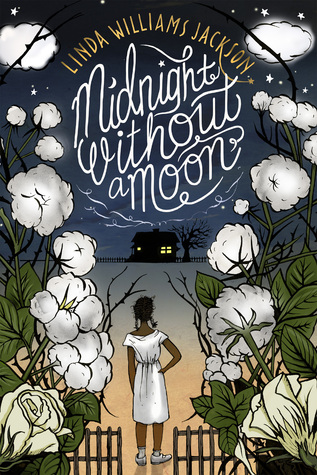First sentence: Papa used to say I had a memory like an elephant's. According to him, an elephant never forgets. I'm not sure how my self-educated, tenant-farming grandfather knew what an elephant's memory was like, but he sure was right about mine. Most folks didn't believe me, but I could remember all the way back from when I was only a year and a half old, when my brother Fred Lee was born. That was June 1943.
Premise/plot: Midnight Without a Moon is set in the summer/autumn of 1955 in Mississippi. It is narrated by Rose Lee Carter, a thirteen year old being raised by her grandparents. Her mother abandoned Rose and her brother, Fred, when she found a new family: Mr. Pete and his two young children. Rose and Fred became "Aunt" and "Uncle." Soon after the novel opens, she learns that her mother, stepfather, and step-siblings are moving to Chicago. This news comes on a day that was already hard for Rose.
The novel in fact opens with Rose Lee being almost run off the road by a white teenage boy. Her grandmother is more upset by the fact that Rose dropped the eggs she was delivering than by the fact that Rose could have been killed. If she was killed, I get the sense that Ma Pearl would still be more upset at the loss of eggs, and the loss of a field worker than a grandchild. If grandchildren were ranked, Rose Lee knows she'd be at the bottom. She is almost certain it's because she's the darkest skinned grandchild. Ma Pearl's favorite, Queen, is the lightest skinned. Queen, who is nearly sixteen, does no house work or field work.
If the novel just focused on the troubled home life of Rose Lee, it would be an emotional coming-of-age novel. But it's not. Rose Lee is coming-of-age at a tumultuous time. While Emmett Till's death isn't the only death--murder--that summer, it is the one that hits closest to home since he was so very young, near Rose's own age.
The community is torn apart: not just facing adversaries from without--the whites--but also from within. There are those--like Ma Pearl--that think the NAACP is of the devil. That Negroes that are killed are killed because they're trouble-makers, they're asking for it. Ma Pearl, for example, blames Till's death not on the white men that murdered him for supposedly whistling at a white woman but on Till and his mother. She should never have let him come south. The mother lacked sense; she should have known better.
Ma Pearl's harsh words aren't just for her closest kin; she is cruel to most everybody.
My thoughts: I took my time reading this one. It was a heartbreaking, emotional read. I ached for Rose. To bear witness to the verbal and sometimes physical abuse was difficult to do. It didn't take me long to HATE Ma Pearl. She made me furious. She left me speechless at times. Rose held onto hope, and her courage to keep hoping kept me reading. I loved her relationship--friendship--with the preacher's son, Hallelujah. Some of my favorite scenes are their conversations with each other.
One more thing I'd like to add is that faith is important in this novel. Rose Lee gets saved in the book and receives baptism. Not many books these days deal with faith in a realistic, positive way.
Quotes:
Maybe Hallelujah was right. Maybe Mississippi itself was hell. No. Mississippi was worse than hell. At least in hell you know who the enemy is. And at least, if you believe the Bible, you know how to keep yourself from going there. But in Mississippi you never knew what little thing could spark a flame and get you killed. (178)
"Stars can't shine without darkness," I said. "What?" "Stars can't shine without darkness." "What's that supposed to mean?" "I have no idea. I don't even know where the words came from....
"Stars can't shine without darkness," Hallelujah repeated. "You've got to have some darkness to know what light is. If every Negro who could leave packed up and left, the struggle wouldn't be the same. Dreams have more meaning when you have to fight for them. (254-5)
© 2018 Becky Laney of Becky's Book Reviews


No comments:
Post a Comment